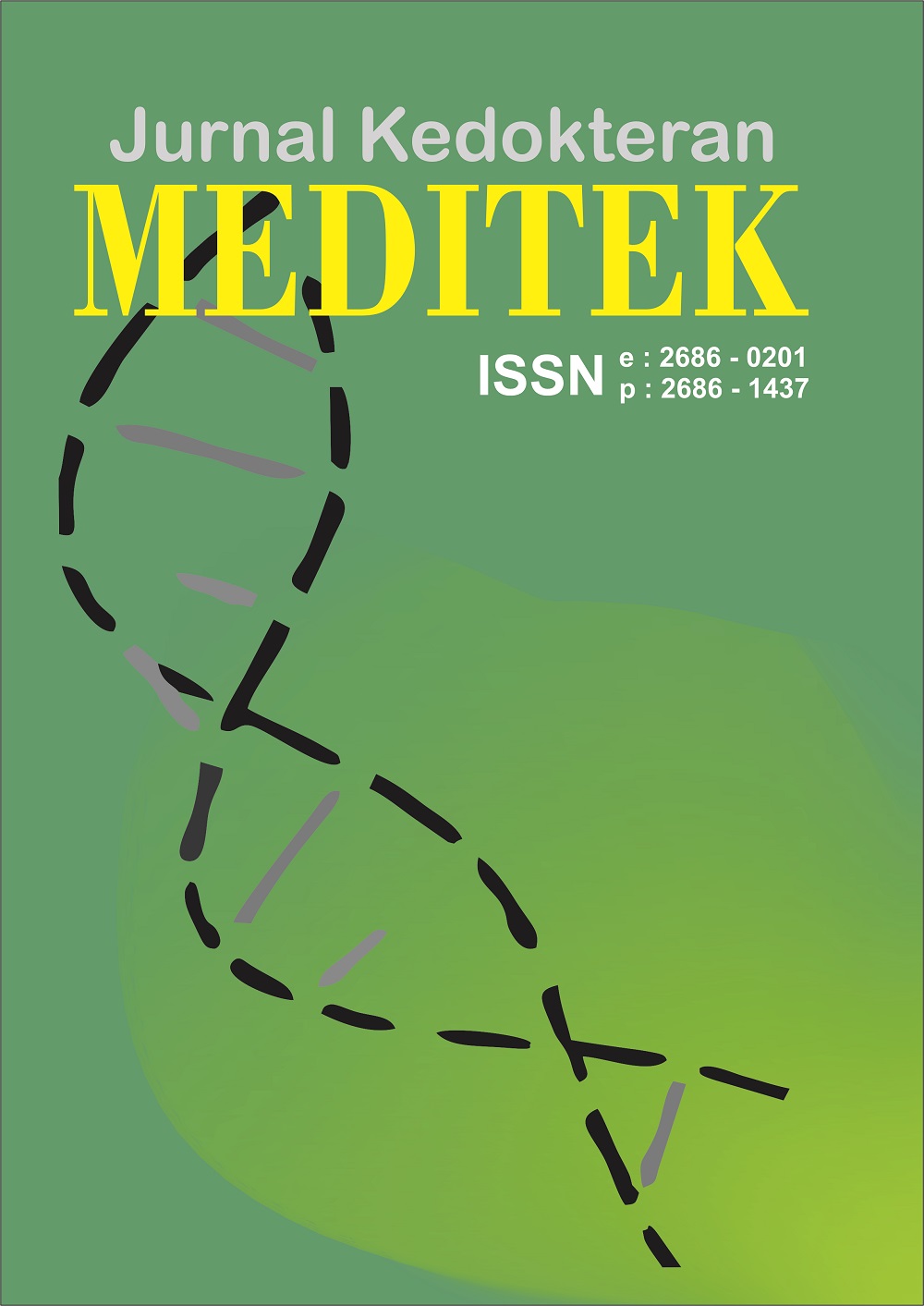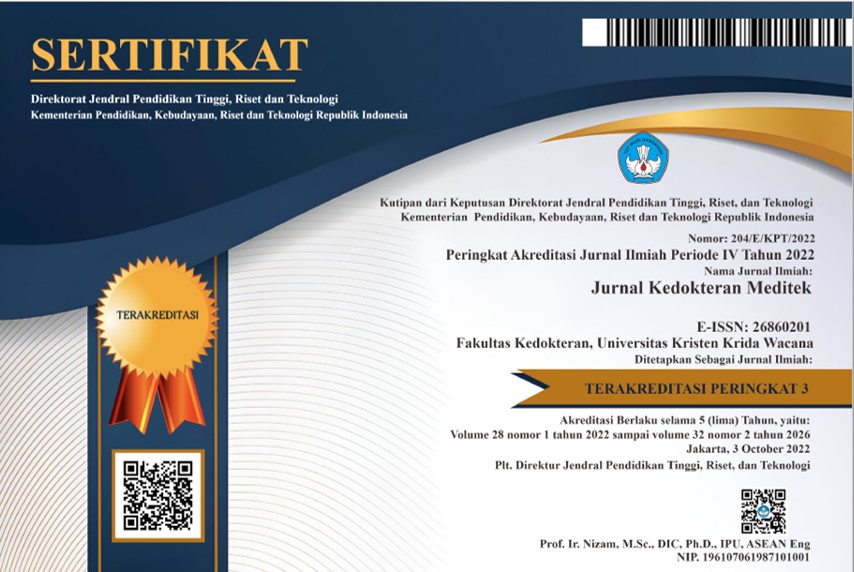Gambaran Kesehatan Mental Emosional Siswa SMA Tahun 2020 Menggunakan Strengths and Difficulties Questionnaire
DOI:
https://doi.org/10.36452/jkdoktmeditek.v27i3.1970Keywords:
emosi, mental, sekolah unggulan, SMA, strengths and difficulties questionnaireAbstract
Di Indonesia, sekolah-sekolah senantiasa berusaha meningkatkan mutu pendidikan yang ada dengan menciptakan sistem pendidikan terbaik bagi para siswanya. Terdapat berbagai sekolah unggulan yang memiliki prestasi akademis maupun non-akademis yang menonjol dalam skala nasional maupun internasional. Namun, siswa di sekolah unggulan juga tidak luput sebagai kelompok yang rentan untuk mengalami gangguan mental emosional seperti stres, depresi, kecemasan, atau gejala somatik. Oleh karena itu, penelitian dilakukan berupa desain penelitian deskriptif dengan pendekatan cross-sectional menggunakan Strengths and Difficulties Questionnaire untuk mengetahui skor masalah emosi dan perilaku pada siswa di sekolah unggulan. Berdasarkan hasil penelitian dari kuesioner yang disebarkan diperoleh data 68 responden siswa SMA Negeri 78 Jakarta yang merupakan salah satu sekolah unggulan, terdapat 28 responden (41%) yang memiliki skor kesulitan di atas batas normal, dimana berarti skor mental emosional serta perilakunya berada dalam kategori borderline (skor perbatasan) dan abnormal (skor tinggi). Hal ini tidak lepas dari adanya peran orangtua, keluarga, teman sebaya, dan lingkungan sekitarnya. Sebagai contoh penghasilan keluarga, status perkawinan orangtua, pola asuh orangtua, urutan kelahiran anak, bullying di sekolah, prestasi yang diraih, jarak sekolah, durasi penggunaan media sosial setiap harinya, serta kendala online learning selama pandemi. Faktor-faktor tersebut dapat mempengaruhi kesehatan mental, emosi, dan perilaku siswa, tak terkecuali di sekolah unggulan.
References
Luthar SS, Kumar NL. Youth in high-achieving schools: challenges to mental health and directions for evidence-based interventions. Dev Psychopathol. 2018; 441–58.
Luthar SS, Barkin SH, Crossman EJ. I can, therefore i must: fragility in the upper-middle classes. Dev Psychopathol. 2013;25(4 PART 2):1529–49.
Luthar SS, Barkin SH. Are affluent youth truly “at risk”? vulnerability and resilience across three diverse samples. Dev Psychopathol. 2012;24(2):429–49.
Luthar SS, Small PJ, Ciciolla L. Adolescents from upper middle class communities: substance misuse and addiction across early adulthood. Dev Psychopathol. 2018;30(1):315–35.
Shek DTL, Li X. Perceived school performance, life satisfaction, and hopelessness: a 4-year longitudinal study of adolescents in Hong Kong. Soc Indic Res. 2016;126(2):921–34.
Wimbarti S, Siregar J, Oktaviana M, Astriningsih R. Strengths and difficulties questionnaire parent report (SDQ-PR) as screening instrument of children mental health in Indonesia. J Psikol. 2019;46(2):130–44.
Ogundele MO. Behavioural and emotional disorders in childhood: a brief overview for paediatricians. World J Clin Pediatr. 2018;7(1):9–26
Khan L. Fatherhood: the impact of fathers on children’s mental health. Cent Ment Heal. 2017;50:1–14.
Suryaputri IY, Rosha BC, Sari K. Gender and other factors and risk of mental emotional problems among students in Indonesia. Heal Sci J Indones. 2013;4(2):98–102
Idaiani S, Sapardin AN, Sulistiowati E. Gender, family income, and the risk of mental emotional disorders in selected population. Heal Sci J Indones. 2015;6(1):23–8.
Gorostiaga A, Aliri J, Balluerka N, Lameirinhas J. Parenting styles and internalizing symptoms in adolescence: A systematic literature review. Int J Environ Res Public Health. 2019;16(17).
Huang CY, Hsieh YP, Shen ACT, Wei HS, Feng JY, Hwa HL, et al. Relationships between parent-reported parenting, child-perceived parenting, and children’s mental health in Taiwanese children. Int J Environ Res Public Health. 2019;166.
Sahithya BR, Manohari SM, Vijaya R. Parenting styles and its impact on children - a cross cultural review with a focus on India. Ment Heal Relig Cult. 2019;22(4):357–83.
Khodabakhsh MR, Kiani F, Ahmedbookani S. Psychological well-being and parenting styles as predictors of mental health among students: implication for health promotion. Int J Pediatr. 2014;2(s5)(9):39–46.
Liem JH, Cavell EC, Lustig K. The influence of authoritative parenting during adolescence on depressive symptoms in young adulthood: examining the mediating roles of self-development and peer support. J Genet Psychol. 2010;171(1):73–92.
Easey KE, Mars B, Pearson R, Heron J, Gunnel D. Association of birth order with adolescent mental health and suicide attempts: a population-based longitudinal study. Eur Child Adolesc Psychiatry. 2019;28(8):1079–86.
Bjørngaard JH, Bjerkeset O, Vatten L, Janszky I, Gunnell D, Romundstad P. Maternal age at child birth, birth order, and suicide at a young age: A sibling comparison. Am J Epidemiol. 2013;177(7):638–44.
Rostila M, Saarela J, Kawachi I. Birth order and suicide in adulthood: evidence from Swedish population data. Am J Epidemiol. 2014;179(12):1450–7.
Risal A, Tharoor H. Birth order and psychopathology. J Fam Med Prim Care. 2012;1(2):137.
Hardt J, Weyer L, Dragan M, Laubach W. Anxiety and depression as an effect of birth order or being an only child: results of an internet survey in Poland and Germany. Insights Depress Anxiety. 2017;1(1):015–22.
Jeremy TJ, Fisher PA. High achieving students and their experience of the pursuit of academic excellence. ISEP Int Symp. 2012;(April):475–99.
Schulte Korne G. Mental health problems in a school setting in children and adolescents. Dtsch Arztebl Int. 2016;113:183–90.
DeLara EW. Consequences of childhood bullying on mental health and relationships for young adults. J Child Fam Stud. 2018;28:2379–89.
Sourander A, Gyllenberg D, Klomek AB, Sillanmäki L, Ilola AM, Kumpulainen K. Association of bullying behavior at 8 years of age and use of specialized services for psychiatric disorders by 29 years of age. JAMA Psychiatry. 2015;73(2):1–7.
Pradhan RK, Sinha N. Impact of commuting distance and school timing on sleep of school students. Sleep Biol Rhythms. 2017;15(2):1–6.
Getachew B. Factors affecting student’s academic performance in ahuntegen general secondary school, North Wollo Zone, Ethiopia. J Educ Learn. 2018;12(2):198–206.
Roberts RE, Duong HT. The prospective association between sleep deprivation and depression among adolescents. Sleep. 2014;37(2):239–44.
Morgenthaler TI, Hashmi S, Croft JB, Dort L, Heald JL, Mullington J. High school start times and the impact on high school students: what we know, and what we hope to learn. J Clin Sleep Med. 2016;12(12):1681–9.
Wheaton AG, Chapman DP, Croft JB. School start times, sleep, behavioral, health, and academic outcomes: a review of the literature. J Sch Heal. 2016;86(5):363–81.
Matricciani L, Olds T, Petkov J. In search of lost sleep: secular trends in the sleep time of school-aged children and adolescents. Sleep Med Rev. 2011;203–11.
Hou Y, Xiong D, Jiang T, Song L, Wang Q. Social media addiction: its impact, mediation, and intervention. Cyberpsychology J Psychol Res Cybersp. 2019;13(1).
Riehm KE, Feder KA, Tormohlen KN, Crum RM, Young AS, Green KM, et al. Associations between time spent using social media and internalizing and externalizing problems among US youth. JAMA Psychiatry. 2019;76(12):1266–73.
Hoge E, Bickham D, Cantor J. Digital media, anxiety, and depression in children. Pediatrics. 2017;140(s2):S76–80.
Uhls YT, Ellison NB, Subrahmanyam K. Benefits and costs of social media in adolescence. Pediatrics. 2017;140:S67–70.
Huang R, DJ L, N A, JF Y, Zhuang RX, Chang TW, et al. Guidance on active learning at home during educational disruption: promoting student’s self-regulation skills in COVID-19 outbreak. UNESCO. 2020.
Xiang M, Zhang Z, Kuwahara K. Impact of COVID-19 pandemic on children and adolescents’ lifestyle behavior larger than expected. Prog Cardiovasc Dis. 2020;1–8.
Fegert JM, Vitiello B, Plener PL, Clemens V. Challenges and burden of the Coronavirus 2019 (COVID-19) pandemic for child and adolescent mental health: a narrative review to highlight clinical and research needs in the acute phase and the long return to normality. Child Adolesc Psychiatry Ment Health. 2020;14(20):1–11.
Wiguna T, Manengkei PSK, Rheza AM, Hapsari WA. Masalah emosi dan perilaku pada anak dan remaja di poliklinik jiwa anak dan remaja RSUPN dr.Ciptomangunkusumo (RSCM) Jakarta. Sari Pediatr. 2010;12(4):270–7
Downloads
Published
How to Cite
Issue
Section
License
Copyright (c) 2021 Nadya Alexia Iskandar, Elly Ingkiriwang, Elly Tania

This work is licensed under a Creative Commons Attribution-NonCommercial-ShareAlike 4.0 International License.


















